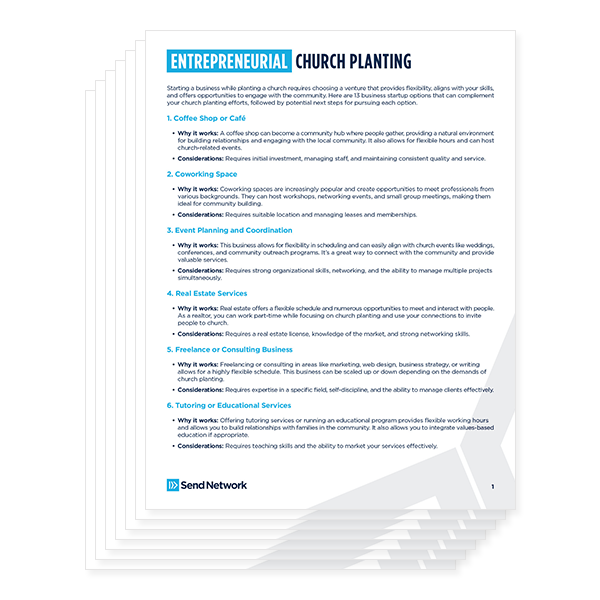There are many reasons you’d want to attend an established church—some good reasons and some, well, not so good ones.
- “They have a better children’s ministry.”
- “They have a better reputation in the city.”
- “They have more people like me.”
- “They have experienced leaders.”
- “They have a style that fits my preferences.”
Throughout my years of church planting, I’ve heard my fair share of these statements. While the motives may be questionable at times, there are valid reasons why someone would desire to attend an established church.
But what about a church plant? I believe there are at least seven reasons why it is advisable, and perhaps preferable, for some people to pour their lives into the mission of a new church.
Don’t hear me wrong. I’m not arguing that ALL people should attend EVERY church plant. Nor am I arguing that EVERY church plant is preferable to ANY established church. What I am arguing is that SOME people should consider investing in church plants for the sake of God’s mission around the world. Here’s why:
1. A church plant may awaken your evangelistic fervor
All people are prone to passivity, particularly in the area of evangelism. A casual glance around an existing church on Sunday morning may lull many Christians to sleep. People show up, so surely evangelism is happening. Right? As a result, many neglect their personal mandate to share the gospel with those far from Christ. A church plant might change this. Twelve people sitting around a living room recognize that the growth of the church hinges on each person taking responsibility for their part of the Great Commission.
2. A church plant may propel you out of complacency
Evangelism is not the only area where Christians are prone to stagnation. We can all yawn our way through worship, disciple-making, fellowship and a host of other facets of the church’s life that are vital for our sanctification. Familiarity and comfort may impede our growth in Christ-likeness far more than we often believe. The newness of a church plant may foster a new desire for growth and transformation.
3. A church plant may immediately utilize your gifts
God gives His church many members with diverse gifts—some eyes, some ears, some feet and some hands. An established church, due to its size, may be blessed with many ears, many eyes, many feet and many hands. This abundance of gifting may cause some to shirk from using their gifts to their full potential. A church plant may call out the gifting of someone hiding in the shadows at a larger church.
4. A church plant may engage your neighbors
Some people are more likely to accept an invitation to attend an established church that has a known reputation in the community, large Sunday gatherings, established programs and a diverse staff. Yet, these churches will not reach all people in any city. For every person who may attend an established church, there are also those who are prone to attend a small church with few programs that meets in their local community. Additionally, a church member who drives 45 minutes across town to attend a church may find that those in their immediate community are more likely to walk to a small church that meets in the local elementary school.
5. A church plant needs mature disciple-makers
All churches need mature disciple-makers, but this reality is compounded in a church plant. A young church is often flooded with new, immature believers in need of discipleship. Men and women who have walked with Jesus for some time know how to love well and can teach someone how to follow Jesus are the most important people in the life of a church plant.
6. A church plant needs diversity
Church plants attract a certain kind of person—often those who are a reflection of the planter and his core team. If this planting team is young, with a lead planter in his early 30s and a team comprised mainly of 20-somethings, then odds are the church will be made up of this demographic as well. With such a homogenous church culture it can be challenging, if not impossible, to create a culture of multi-generational discipleship. Who is going to walk a couple through a marriage crisis, comfort someone in suffering, or help someone understand the depths of the gospel if no one in the church has lived long enough to walk through these seasons themselves?
7. A young church planter needs encouragement, support and wisdom
Finally, every church planter will attest to the lonely, difficult days, filled with doubt, discouragement, and often, despair. Planters need an older man to come alongside of them, pray diligently on their behalf and remind them of the beautiful truths of the gospel. Often, those who have walked with Jesus and served in a church for some time are best positioned to extend this type of burden-bearing love.
Church plants are not for everyone, but they are for some. Without godly, mature Christ-followers, church plants will simply not last. Perhaps God is calling you to take a risk and give your life to serve alongside of a church plant today.
Published September 26, 2017




